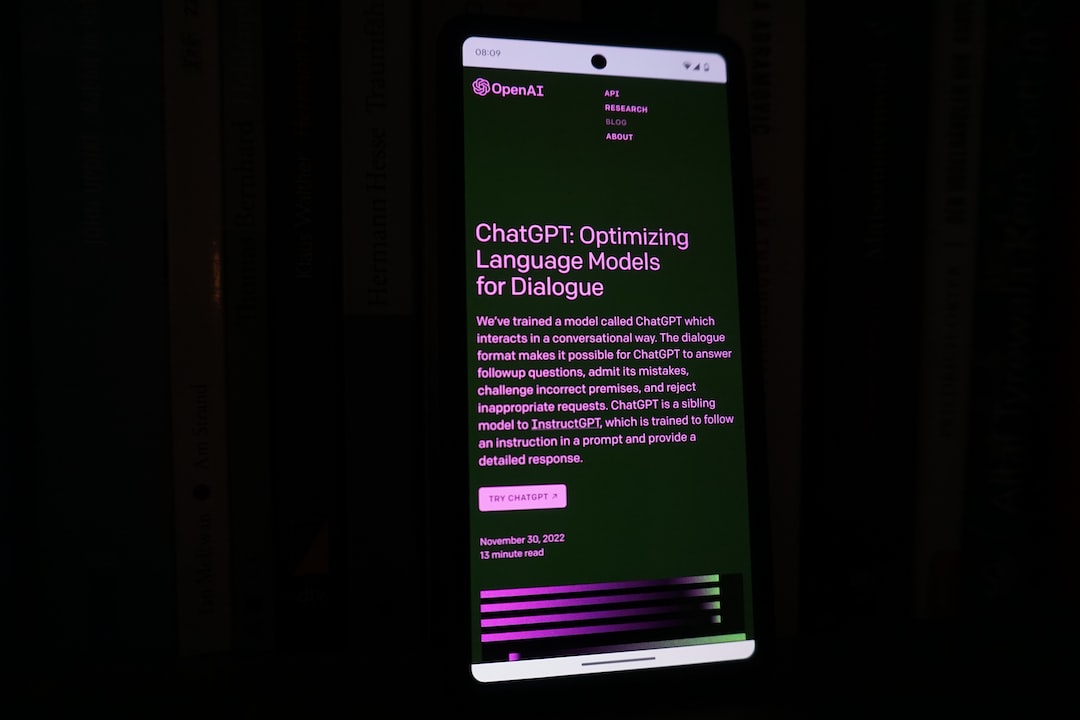Unlocking the SEO Potential: Is AI written content the next game changer?
Introduction to AI-written content for SEO
Artificial Intelligence (AI)-written content is a rapidly emerging trend in the world of search engine optimization (SEO). With advancements in machine learning and natural language processing, AI has become capable of producing high-quality, human-like content that is optimized for search engines.
AI-written content offers several benefits for SEO. First and foremost, it can save time and resources. AI algorithms can generate content at a much faster pace than human writers, allowing businesses to create a large volume of optimized content in a shorter period of time.
Furthermore, AI-written content can be tailored to target specific keywords and optimize on-page elements such as headings, meta descriptions, and image alt tags. This can improve the visibility of web pages in search engine results and increase organic traffic.
However, there are also potential drawbacks to consider. While AI can produce grammatically correct and well-structured content, it may lack the creativity, context, and nuanced understanding that human writers bring to the table. Additionally, there is a risk of generating generic or duplicate content that could negatively impact a website’s search engine rankings.
Overall, AI-written content can be a valuable tool for SEO when used strategically. It can assist with generating optimized content at scale, but it should be combined with human input to ensure relevance, creativity, and authenticity.
Benefits of using AI-powered content generators for SEO
AI-powered content generators offer numerous benefits for search engine optimization (SEO). These advanced systems utilize artificial intelligence algorithms to automatically generate written content in a quick and efficient manner.
One major advantage of using AI for content generation is the ability to produce a large volume of high-quality content in a short period of time. This is particularly beneficial for websites or businesses that require a constant stream of fresh and relevant content to improve their search rankings. AI content generators can create engaging articles, blog posts, and product descriptions that are optimized for specific keywords, helping to boost organic traffic and improve search engine visibility.
Furthermore, AI-powered tools can analyze vast amounts of data and employ natural language processing techniques to generate content that is not only informative but also highly relevant to the target audience. By understanding user intent and preferences, AI-generated content can be tailored to meet the specific needs and interests of website visitors, resulting in higher user engagement and increased conversions.
In addition, AI content generators can assist with optimizing content for SEO by providing insights into keyword usage, identifying potential content gaps, and suggesting related keywords and topics. This helps content writers and SEO professionals to create content that aligns with search engine algorithms and user search queries, resulting in improved rankings and visibility.
How AI-powered tools optimize content for better SEO
AI-powered tools have revolutionized the way content is optimized for better SEO. These tools utilize advanced algorithms and machine learning to analyze various aspects of content and provide valuable insights for improvement.
One key area where AI-powered tools excel is in keyword research. They can analyze large volumes of data, including search trends, competition, and user behavior, to identify the most relevant and high-traffic keywords for a particular topic. This helps content writers and SEO professionals to strategically incorporate these keywords into their content, increasing its visibility and ranking in search engine results.
Additionally, AI tools can analyze the structure and readability of content. They can detect issues such as excessive use of passive voice, long sentences, or lack of subheadings, which can negatively impact user experience and SEO. By providing suggestions for improvement, AI-powered tools help optimize content to be more engaging and user-friendly.
Another significant advantage of AI tools is their ability to analyze the performance of existing content. They can track metrics such as search rankings, organic traffic, and user engagement, providing valuable insights on what content is performing well and what needs further optimization.
The role of AI in automated content creation and scheduling
Artificial Intelligence (AI) has revolutionized various industries, and content creation is no exception. AI-powered tools can assist in automated content creation and scheduling, streamlining the process and improving efficiency.
AI algorithms can generate high-quality written content by analyzing data and patterns from existing sources. These tools can use Natural Language Processing (NLP) techniques to understand and mimic human language, resulting in content that is easy to read and informative. AI-written content can be tailored to specific audiences, incorporating keywords and optimizing for search engine rankings.
Automated content creation and scheduling can save time and resources for businesses, allowing them to produce a larger volume of content in a shorter period. With AI, content can be generated and scheduled across various platforms, ensuring a consistent and frequent online presence.
However, while AI-written content offers advantages in terms of speed and efficiency, it is essential to maintain a balance between automation and human creativity. Human input is still necessary to ensure content aligns with brand values, maintains an authentic voice, and resonates with the target audience.
The impact of AI-generated content on search engine rankings
The use of AI-generated content has become increasingly popular in recent years, particularly in the world of SEO. AI technology has the ability to produce large volumes of content in a short amount of time, which can be advantageous for companies looking to optimize their search engine rankings.
One of the key benefits of AI-written content for SEO is its potential to improve website rankings. Search engines like Google place a high value on fresh, relevant, and unique content. By using AI technology, companies can generate a large amount of content that meets these criteria, which can help improve their search engine rankings.
However, there are also potential downsides to using AI-generated content for SEO. One such concern is the quality of the content. While AI technology has improved significantly in recent years, it still lacks the ability to fully replicate human creativity, nuance, and context. This can result in content that feels robotic, lacks depth, or fails to engage readers.
In addition, there is a risk of duplicate or low-quality content when using AI. Some AI tools may draw information from pre-existing sources, leading to content that is not original or may violate copyright laws. Search engines penalize websites with duplicate or low-quality content, which can negatively impact their rankings.
Ultimately, the impact of AI-generated content on search engine rankings will depend on various factors including the quality of the content, the specific AI technology used, and how it is implemented. It is important for companies to carefully consider these factors and ensure that AI-generated content aligns with their SEO strategy and goals.
Tips for effectively using AI writing tools for SEO
AI writing tools can be a valuable asset for SEO when used effectively. Here are some tips to make the most out of AI written content for SEO:
1. Use AI writing tools as a starting point:
While AI can generate content quickly, it’s essential to remember that it may lack the creativity and human touch needed to connect with your audience fully. Use AI-generated content as a foundation and then add your unique style and insights to make it more engaging.
2. Optimize keywords and meta tags:
AI writing tools can help you identify relevant keywords and create meta tags for your content. Be sure to optimize your content with these keywords to improve its visibility in search engine results.
3. Proofread and edit:
AI writing tools may not be perfect and can sometimes generate errors or inconsistencies. Always proofread and edit the content generated by AI to ensure accuracy and coherence.
4. Prioritize quality over quantity:
While AI can generate content quickly, focus on creating high-quality and informative content that provides value to your audience. Quality content is more likely to perform well in search engine rankings and attract organic traffic.
Potential drawbacks and challenges of relying on AI-generated content
While AI-generated content can be beneficial for SEO in terms of efficiency and speed, there are potential drawbacks and challenges that need to be considered. One major concern is the lack of human creativity and originality in AI-written content. AI algorithms are limited to what they have been trained on and may struggle to produce unique and engaging content that resonates with readers. This can result in generic and repetitive content that fails to stand out or capture the attention of the target audience. Another challenge is the potential for errors and inaccuracies in AI-generated content. Despite advancements in natural language processing, AI algorithms may still misinterpret information or generate incorrect statements, which can harm the credibility of the content and the website. Additionally, AI-written content may lack the ability to understand and incorporate the nuances and intricacies of language, which is important for conveying tone, emotion, and context. This can lead to content that feels robotic, impersonal, and disconnected from the human experience. As a result, businesses should carefully consider the trade-offs and potential risks before relying solely on AI-generated content for their SEO strategies.
Best practices for integrating AI-written content into SEO strategies
Integrating AI-written content into SEO strategies can be an effective way to improve website rankings and increase organic traffic. However, there are best practices that should be followed to ensure the content is of high quality and aligns with search engine guidelines.
Firstly, it’s important to thoroughly review and edit AI-generated content to ensure accuracy and coherence. While AI can assist in generating content, it may not always produce perfect results. By reviewing and editing the content, you can enhance its readability and make it more engaging for users.
Secondly, it’s essential to conduct thorough keyword research and integrate relevant keywords naturally throughout the AI-generated content. This will help search engines understand the topic and relevance of the content, thereby improving its visibility in search results.
Additionally, it’s crucial to regularly monitor and analyze the performance of AI-written content. This includes tracking keyword rankings, monitoring organic traffic, and analyzing user engagement metrics. By monitoring performance, you can identify areas for improvement and make data-driven decisions to optimize the content for better SEO results.
AI-powered content generators offer numerous benefits for search engine optimization (SEO). They can save time and resources by generating a large volume of high-quality, optimized content in a shorter period. AI-generated content can be tailored to target specific keywords and optimize on-page elements, improving the visibility of web pages in search engine results and increasing organic traffic. While there are potential drawbacks to consider, such as the lack of creativity and the risk of generating generic or duplicate content, AI-written content can be a valuable tool for SEO when used strategically. It can assist with generating optimized content at scale, but it should be combined with human input to ensure relevance, creativity, and authenticity.
To stay ahead in the SEO game, it is essential to embrace tools like WPHorde. WPHorde is an AI-powered content generator platform that can transform your SEO strategies. With its advanced algorithms and natural language processing techniques, WPHorde can help you create high-quality, optimized content that drives organic traffic to your website. Don’t get left behind. Take action now and visit WPHorde to unlock the full potential of AI-written content for your SEO success.

